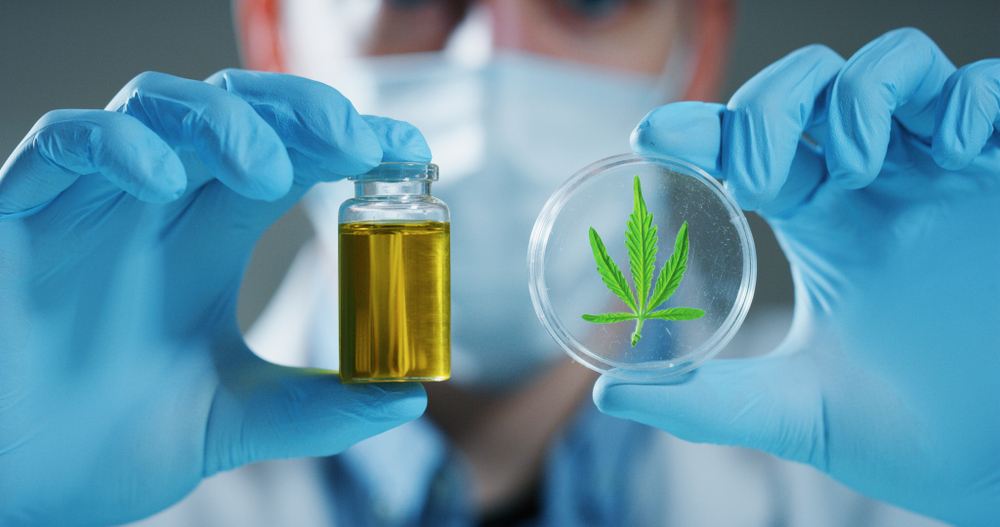Table of Contents
Introduction
HHC, or Hexahydrocannabinol, is a cannabinoid from the cannabis plant family. It is structurally similar to THC (Tetrahydrocannabinol), the primary psychoactive compound in cannabis, but with a slight difference in its molecular structure. HHC is created through hydrogenation, which adds hydrogen atoms to the chemical makeup of THC.
While HHC shares similarities with THC, it is known to produce milder psychoactive effects. It interacts with the body’s endocannabinoid system, which regulates various physiological processes, including mood, pain perception, and appetite.
As a lesser-known cannabinoid, HHC is still being researched to understand its potential benefits and effects on the human body.

A brief comparison to other cannabinoids
When exploring the world of cannabinoids, it is fascinating to compare and contrast their properties and effects. While THC (Tetrahydrocannabinol) and CBD (Cannabidiol) are well-known and widely studied, there are numerous other cannabinoids that offer unique characteristics and potential therapeutic benefits.
If you are curious you can check out our article devoted to all the secondary cannabinoids: “A Comprehensive Analysis of Secondary Cannabinoids”
Understanding HHC
Chemical Structure and Properties of HHC
The chemical structure and properties of HHC (Hexahydrocannabinol) play a significant role in understanding its potential effects and interactions within the body. HHC shares similarities with THC (Tetrahydrocannabinol), one of the primary psychoactive compounds found in cannabis, but with a slight difference in its molecular arrangement.
At the core, HHC possesses a hexahydro-1H-inden-1-yl moiety, which distinguishes it from THC. This structural variation arises from the addition of extra hydrogen atoms, resulting in a unique configuration. While the exact implications of this variation are still being explored, it is believed to influence the interactions of HHC with the body’s endocannabinoid system.
HHC, like THC, is a cannabinoid that interacts with cannabinoid receptors in the body. These receptors are part of the endocannabinoid system, which plays a crucial role in regulating various physiological processes such as mood, pain perception, and appetite. The specific binding and activation of these receptors by HHC contribute to its potential effects.
While research on HHC is limited, some studies suggest that it possesses psychoactive properties, albeit milder compared to THC. This implies that HHC may produce less pronounced intoxicating effects or a more subtle alteration of perception and cognition. Further investigations are needed to understand the exact mechanisms through which HHC interacts with cannabinoid receptors and influences physiological processes.
In terms of its properties, HHC is believed to have a lower affinity for cannabinoid receptors compared to THC. This difference in binding affinity may contribute to its milder psychoactive effects. The distinct molecular structure of HHC may also impact its stability, metabolism, and potential interactions with other compounds in the body.
It’s important to note that the properties and effects of HHC can vary depending on factors such as dosage, administration method, and individual sensitivity.

Natural sources and extraction methods
HHC (hexahydrocannabinol) is a cannabinoid that can be found in certain cannabis strains. However, it occurs naturally in relatively low concentrations compared to other cannabinoids like THC and CBD. As a result, the extraction of HHC from cannabis plants can be a challenging process.
There are various extraction methods used to obtain HHC, each with its advantages and limitations. One common method is solvent extraction, where a solvent like ethanol or butane is used to dissolve the cannabinoids from the plant material. This process typically involves soaking the cannabis plant in the chosen solvent, followed by filtration and evaporation to remove the solvent and obtain the desired extract.
Another extraction method that can be used for HHC is CO2 extraction. This method involves using pressurized carbon dioxide to extract the cannabinoids from the plant material. CO2 acts as a solvent under high pressure and temperature, allowing for efficient extraction. The resulting extract can then be further processed to isolate HHC.
It’s important to note that the extraction of HHC requires specialized equipment and expertise due to its relatively low concentrations in cannabis plants. Additionally, strict quality control measures are necessary to ensure the purity and safety of the extracted HHC.
As the interest in HHC grows, there is ongoing research into developing more efficient extraction methods specifically targeting this cannabinoid. Scientists are exploring innovative techniques to isolate and concentrate HHC, potentially making it more readily available for further study and potential applications.
It’s worth mentioning that the legality and regulation surrounding HHC extraction and usage can vary between jurisdictions. It’s essential to understand and adhere to local laws and regulations when engaging in the extraction, possession, or use of HHC.

Exploring the Effects of HHC
The potential therapeutic benefits of HHC(Hexahydrocannabinol) are an area of growing interest and research within the field of cannabinoid science. While HHC is a lesser-known cannabinoid, early studies suggest that it may possess several potential therapeutic properties. Let’s explore some of the potential therapeutic benefits of HHC in more detail.
Pain Management: HHC has shown promise as a potential tool in managing pain and inflammation. Research suggests that HHC interacts with the body’s endocannabinoid system, which plays a crucial role in regulating pain and inflammation. By targeting cannabinoid receptors, HHC may help modulate the perception of pain and reduce inflammation in the body.
This potential makes HHC a candidate for addressing various types of pain, including chronic pain conditions, neuropathic pain, and inflammatory disorders. Moreover, HHC’s ability to potentially alleviate inflammation holds promise for managing conditions such as arthritis, inflammatory bowel disease, and other inflammatory ailments. However, it’s important to note that further research is necessary to fully understand the mechanisms of action, optimal dosages, and long-term effects of HHC in pain and inflammation management. Clinical trials and studies focusing specifically on HHC’s efficacy and safety are needed to determine its potential as a therapeutic option for individuals seeking relief from pain and inflammation.
Neuroprotective Effects: Preliminary studies suggest that HHC may have neuroprotective properties, meaning it could help protect and preserve brain cells from damage. This potential neuroprotective effect may have implications for conditions such as neurodegenerative diseases and traumatic brain injuries. However, further research is needed to fully understand the mechanisms involved and the extent of HHC’s neuroprotective effects.
Anti-inflammatory Properties: Inflammation is a key component of many health conditions, including autoimmune diseases and chronic inflammatory disorders. Early studies suggest that HHC may possess anti-inflammatory properties, potentially making it a candidate for managing inflammatory conditions. By modulating the inflammatory response, HHC may help reduce inflammation and associated symptoms.

Mood Regulation: The endocannabinoid system plays a role in regulating mood and emotional well-being. HHC, like other cannabinoids, may influence mood by interacting with cannabinoid receptors. Some studies suggest that HHC may have potential antidepressant and anxiolytic effects, indicating its potential in managing mood disorders and anxiety-related conditions. However, more research is needed to establish its efficacy and safety in this regard.
Appetite Stimulation: HHC may also have the potential as an appetite stimulant. Some studies indicate that cannabinoids can enhance appetite by activating specific receptors in the brain involved in regulating hunger and satiety. For individuals experiencing appetite loss or reduced food intake due to medical conditions or treatments, HHC could potentially help restore appetite and promote adequate nutrition.
Differences in psychoactive effects compared to THC
One of the key factors that set HHC (Hexahydrocannabinol) apart from THC (Tetrahydrocannabinol) is the difference in their psychoactive effects. While both compounds are cannabinoids and interact with the body’s endocannabinoid system, they exhibit distinct psychoactive properties.
THC is well-known for its psychoactive effects, which can include feelings of euphoria, relaxation, altered perception of time, and heightened sensory experiences. These effects are primarily attributed to THC’s interaction with cannabinoid receptors in the brain, particularly the CB1 receptors. THC’s ability to bind and activate these receptors leads to the psychoactive effects commonly associated with cannabis use.
In contrast, HHC has been reported to have a milder psychoactive profile compared to THC. While HHC does interact with cannabinoid receptors, it has a lower affinity for the CB1 receptors, which are primarily responsible for the psychoactive effects of THC. As a result, HHC is believed to produce less intense psychoactive effects, making it potentially more tolerable for individuals who may be sensitive to the strong psychoactivity of THC.
The reduced psychoactivity of HHC compared to THC makes it an intriguing option for those seeking the potential therapeutic benefits of cannabinoids without the intense psychotropic experiences. It may provide an alternative for individuals who want to avoid or minimize the cognitive impairment or altered mental states typically associated with THC use.
However, it’s important to note that the psychoactive effects of HHC can still vary depending on factors such as dosage, individual sensitivity, and the presence of other cannabinoids or terpenes in the cannabis product.
Safety and Side Effects of HHC
Ensuring the safety and understanding of the potential side effects of HHC is crucial when considering its use. While research on HHC is still limited, the existing data suggest that it may have a favorable safety profile. Preliminary studies indicate that HHC is well-tolerated, with no significant adverse effects reported.
However, it’s important to note that individual responses may vary, and further research is needed to comprehensively evaluate the safety of HHC in various populations, including vulnerable groups such as pregnant or breastfeeding individuals, children, and those with underlying medical conditions.
As with any cannabinoid, it’s essential to consider potential side effects. While HHC is believed to have milder psychoactive effects compared to THC, some individuals may still experience mild cognitive impairment, drowsiness, or changes in mood or perception.
Interactions with medications should be taken into account, and it’s advisable to consult with a healthcare professional before incorporating HHC into a treatment regimen. Overall, more research is necessary to fully understand the long-term effects and potential risks associated with HHC use.

Possible adverse effects and precautions
It’s also important to consider potential interactions with medications. HHC may interact with certain drugs, including those metabolized by liver enzymes such as cytochrome P450. Therefore, it’s recommended to consult with a healthcare professional before using HHC, especially if you are taking any medications or have underlying medical conditions. It’s also essential to ensure the quality and purity of the HHC product you are using.
Obtaining HHC from reputable sources and ensuring third-party lab testing for potency and contaminants can help minimize potential risks. It’s important to start with a low dosage and gradually increase it as needed while closely monitoring your response.
It’s advisable to discontinue use if any adverse effects occur and seek medical attention if necessary. Overall, while HHC may have a favorable safety profile, being informed, cautious, and consulting with healthcare professionals can help mitigate potential risks and ensure the safe and responsible use of HHC.
Conclusion
In conclusion, HHC (Hexahydrocannabinol) is a cannabinoid that has gained attention for its potential therapeutic benefits. While research on HHC is still in its early stages, preliminary studies suggest that it may offer a range of potential advantages. HHC’s unique chemical structure and interactions with the endocannabinoid system open up possibilities for pain management, inflammation reduction, mood regulation, and other therapeutic applications.
Additionally, HHC’s milder psychoactive effects compared to THC make it an intriguing alternative for individuals seeking the potential benefits of cannabinoids without intense psychotropic experiences. However, it is crucial to conduct further research to fully understand the safety, optimal dosage, and long-term effects of HHC.
Consulting with healthcare professionals and ensuring product quality and purity are essential when considering the use of HHC. As the scientific community continues to investigate HHC, it holds promise as a potential therapeutic compound, but caution and responsible use are necessary.





